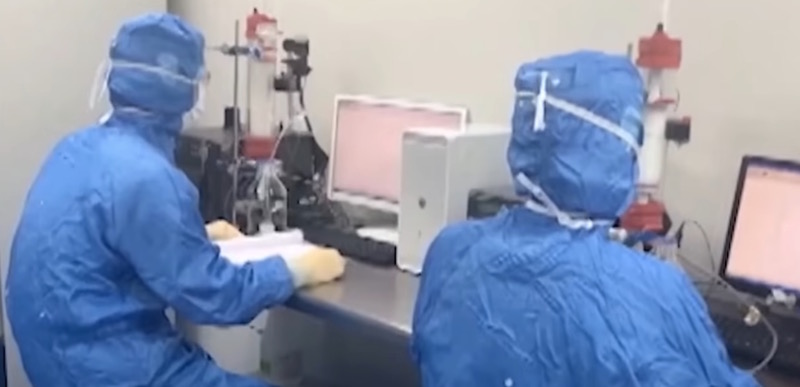So the CDC is now admitting that they screwed up with a technical issue about compiling and reporting the official count of coronavirus cases. From the Hill:
The Centers for Disease Control and Prevention (CDC) acknowledged Thursday that it is combining the results from viral and antibody COVID-19 tests when reporting the country’s testing totals, despite marked differences between the tests.
First reported by NPR’s WLRN station in Miaimi, the practice has drawn ire from U.S. health experts who say combining the tests inhibits the agency’s ability to discern the country’s actual testing capacity.
“You’ve got to be kidding me,” Ashish Jha, director of the Harvard Global Health Institute, told The Atlantic. “How could the CDC make that mistake? This is a mess.”
I know a lot of people are going to make a big deal out of this, but I have to admit that I don’t even understand why that’s such a big issue, and I doubt many of the people who are angry about this do either, so there’s that. Anyway, more:
Viral tests — commonly referred to as PCR tests as most of them use a process known as polymerase chain reaction — are used by health professionals to determine whether or not a person is currently infected with the disease. During the pandemic, viral tests have been the most effective way of being able to diagnose a positive case of COVID-19. They are what state governments have been counting to track the number of confirmed cases of the virus they have.
Antibody, or serology, tests serve a different purpose. Unlike viral tests that are taken by nose swab or saliva sample, antibody tests examine a person’s blood to see if their immune system has created antibodies to combat COVID-19. These tests allow doctors to see if someone has previously been exposed to the virus. As the push for widespread testing in the U.S. has strengthened, antibody tests have been widely produced, many experts have balked at saying that antibodies equate to immunity from COVID-19. Serology tests are also less accurate than PCR tests, increasing the chances for a false negative.
So, a false negative means that they would report someone didn’t have coronavirus in the past, when they did have in the past, thus lessening the number of actual cases. Lessening.
Somehow, people like this guy think this proves Fauci is cooking the books.
Everybody laughed when I said the CDC and Fauci were cooking the books. Some rando loser with a dumb hat even went so far as to question the veracity of my predictions. Let's see what the numbers are after all the cheating has been factored out. https://t.co/UkOD8seDP6
— New York City Guns (Parler: @NYCG) (@NewYorkCityGuns) July 19, 2020
Cooking the books to lessen the numbers of positives? That’s a bold strategy, let’s see if it works out.
But it sounds like the issue is that you’re basically comparing apples and oranges. Or grapes and bananas. Or potatoes and potah-toes. To wit:
Moreover, a negative test means different things for either test. A negative PCR test indicates to physicians that the patient isn’t currently ill with the disease. But, a negative serology test means that the patient has most likely not been exposed to or infected with COVID-19.
“The viral testing is to understand how many people are getting infected, while antibody testing is like looking in the rearview mirror. The two tests are totally different signals,” Jha told The Atlantic.
In a statement, CDC spokeswoman Kristen Nordlund told The Hill that when the agency began to track coronavirus testing, viral tests were far more commonly used nationwide than serology testing.
“Now that serology testing is more widely available, CDC is working to differentiate those tests from the viral tests and will report this information, differentiated by test type, publicly on our COVID Data Tracker website in the coming weeks,” she said.
Finally…
“I suspect it will artificially lower the percent positive,” Caitlin Rivers, an epidemiologist at the Johns Hopkins Bloomberg School of Public Health, told NPR.
So there you go. Make of that what you will.
~ ~ ~ ~ ~ ~
Well that is it for Saturday, we hope you’re having a good one. Have an open thread you lucky people. Here’s some comment fodder:
@brianhund @ZachWaldman pic.twitter.com/vLFyccRTP1
— David Deeble (@DavidDeeble) July 18, 2020
Morning of my dad's wedding, I was 14. Why do I look like a disgraced UKIP candidate pic.twitter.com/Ezgp0OwK5V
— Ben (@CEOofMicrosoft) July 17, 2020
people who post pictures to the reviews section of online shopping websites: the progeny of heaven await you with open arms. you shall be seated at the right hand of the father, anointed by grace. may you be adorned by a cloak of righteousness, bejeweled in perfect love, such tha
— normal regular guy (@cowboypraxis) July 17, 2020
You think that Marco Rubio tweeting out a picture of himself with Elijah Cummings as a tribute to John Lewis is bad enough, but then you realize Rubio also made it his Twitter avatar.
Just unreal. pic.twitter.com/ktTBeEBrXy
— Josh Jordan (@NumbersMuncher) July 18, 2020
Sigh… poor Marco. Enjoy your Saturday evening, kids!!!

